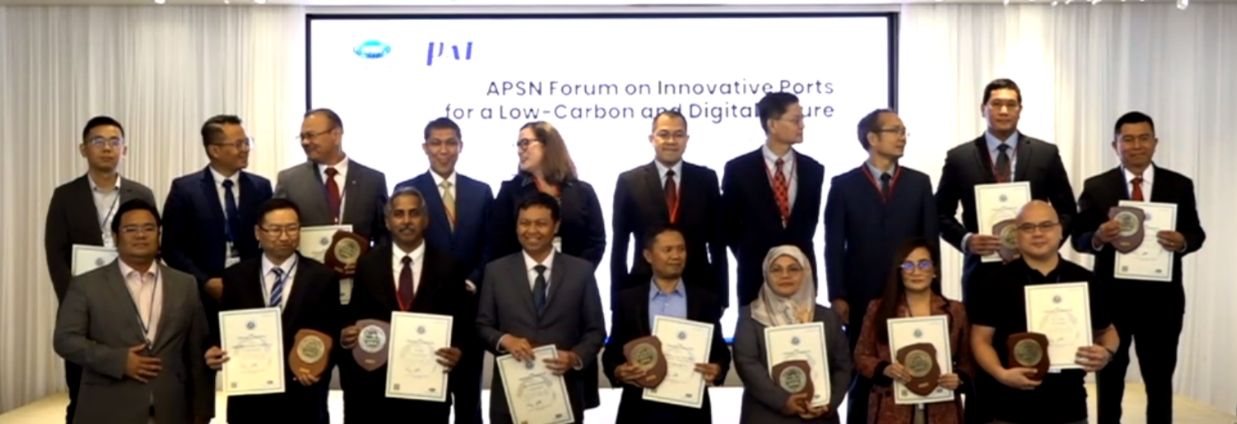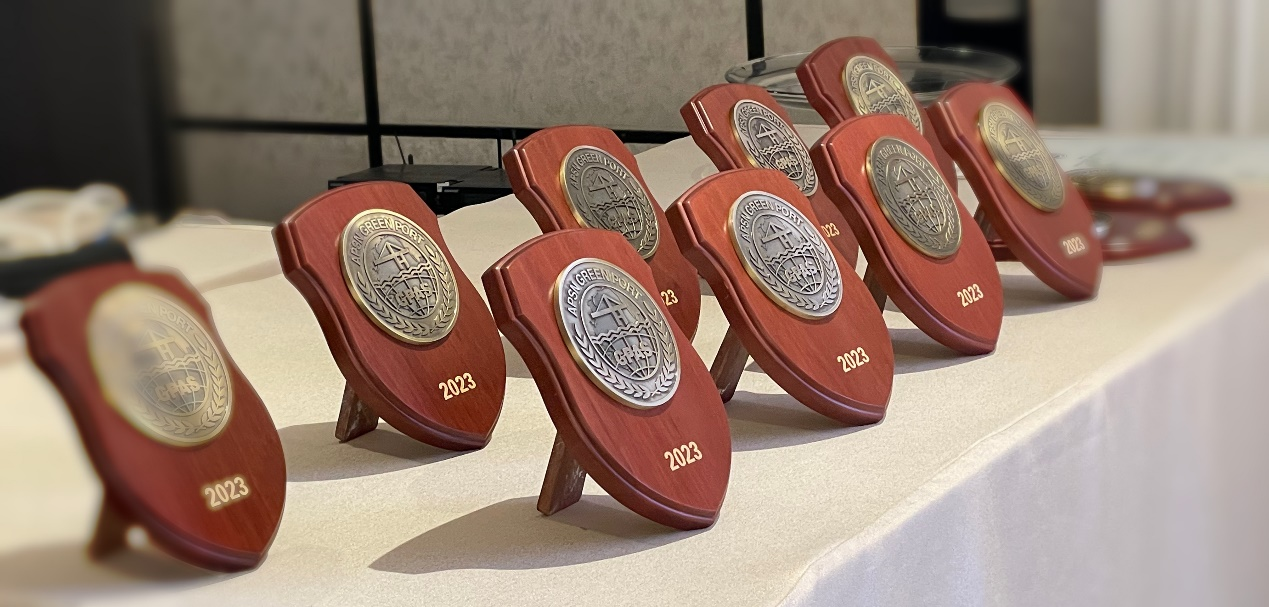
Green Port Award System (GPAS) Award Ceremony 2023 was held by APEC Port Services Network (APSN) on October 24, 2023 in Bangkok, Thailand during its Forum on Innovative Ports for a Low-Carbon and Digital Future. Ms. Sonya Read, Acting President of APSN Council, Mr. Tan Cheng Peng, the 1st Vice President of APSN Council, Capt. Mohamad Halim Bin Ahmed, the 2nd Vice President of APSN Council, Mr. Li Qing, Acting Secretary-General of APSN as well as Mr. Kriengkrai Chaisiriwongsuk, Director General of the Port Authority of Thailand attended the ceremony and presented the GPAS Awards to the winners of 2023. At the ceremony, Mr. Cai Ouchen, Deputy Director of APEC Port Study Center presented the Updates on the GPAS program, including its overview, the collection of the best practices by APSN Green Ports and the future updating of the GPAS system.

53 ports from 10 APEC economies have won the GPAS Awards since 2016 when this program was officially launched. In 2023, 13 ports from 7 APEC economies become the new winners, which are:
1 Bintulu Port Authority
Bintulu Port Authority plays the role in overseeing all activities at Bintulu Port, which is a multipurpose port and also the main gateway for export of LNG from Malaysia. It won its first GPAS Award in 2017.
Highlighted green initiatives and achievements:
l The ambitious green development plan covering all needed aspects and closely connecting with digitalization and carbon neutrality.
l Innovative applications of solar power.
l Electricity supply to both vessels and cargo handling equipment.
l A remarkable energy consumption reduction resulted by a series of energy conservation measures.
2 Kai Tak Cruise Terminal
Hong Kong, China’s Kai Tak Cruise Terminal, managed and operated by Worldwide Cruise Terminals has long been participated in the GPAS program and won its past GPAS Awards in 2018 and 2020.
Highlighted green initiatives and achievements:
l Continuous upgrade on its electrical equipment.
l Feasibility study on the LNG bunkering for vessels.
l Electricity supply to transiting buses.
3 Kertih Port Sdn Bhd
Kertih Port is a wholly owned subsidiary of Petronas Chemical Group, located in Kertih, Malaysia, for the transport of the petrochemical, oil and gas products.
Highlighted green initiatives and achievements:
l Long-term plan for net zero carbon emission.
l Wonderful start in using shore power for harbor craft.
l Large-scale utilization of LED lights.
l Implementation of rain-water harvest and Phasing out Single Use Plastic program.
l Impressive preparedness for oil spill emergency response.
4 Laem Chabang Port
Laem Chabang Port is the main deep sea port of Thailand, which is operated by the Port Authority of Thailand. This is its 2nd GPAS Award since 2019.
Highlighted green initiatives and achievements:
l Roadmap to corporate carbon neutrality as well as the application of the bio-circular-green economy.
l Utilization of electric trucks.
l Larger-scale adoption of solar power, LED lighting and shore power for vessels.
l Re-use of plastic waste.
5 Nanjing Port Longtan Container Co., Ltd.
The company operates the Nanjing Port Longtan Container Terminal located in the Longtan Waterway of the Yangtze River in China.
Highlighted green initiatives and achievements:
l Larger-scale utilization of various kinds of clean energy, including LNG, solar power, wind power and electricity.
l Many ways for energy saving, including water-to-water transshipment, smart gate system and other intelligent control technologies.
l Linking the digitalization and automation to the environmental protection and pollutant control in all aspects.
6 Pertamina Trans Kontinental Shorebase Tanjung Batu
Pertamina Trans Kontinental (PTK) Shorebase Tanjung Batu is an Indonesian private interest terminal operated by PTK, providing integrated warehouse supply and transport services in supporting oil and gas operations.
Highlighted green initiatives and achievements:
l Rainwater harvesting and oily wastewater treatment.
l Ambitious plan on solar power utilization.
l Biodiesel use for harbor craft and cargo handling equipment.
7 Port Klang
Port Klang is Malaysia’s principal gateway and the busiest port, managed by Port Klang Authority, and operated by Northport (Malaysia) Bhd and Westports Malaysia Sdn Bhd. Before this one, it won its past GPAS Awards in 2016 and 2020.
Highlighted green initiatives and achievements:
l Continuous 3R Campaign of waste management, No Single-Use Plastic Policy and cleanup programs.
l Continuous mangrove planting.
l Construction of a centralized biomass logistics hub.
l Adoption of green building techniques.
l Clean energy usage including solar power, electric trucks, RTGs and bikes, and shore power for vessels.
l LED lighting and rainwater harvesting.
8 Port of Batangas
Port of Batangas, winning its first GPAS Award in 2017, functions as the alternate to the Port of Manila, serving as the main maritime gateway to several islands in the Philippines.
Highlighted green initiatives and achievements:
l A decarbonisation strategy with clear mid-term and long-term goals.
l A great number of environmental promotion campaigns including the No to Single-Use Plastic Campaign, mangrove tree planting and re-use of lead acid batteries.
l Clean energy usage including solar power and electric shuttles.
l A number of effective energy-saving measures including digitalized tracking of personnel and LED lighting.
l Wastewater re-use and rainwater collection.
9 Port of Petrokimia Gresik
Port of Petrokimia Gresik is an international port owned by Petrokimia Gresik, the largest and most comprehensive fertilizer company in Indonesia.
Highlighted green initiatives and achievements:
l Large-scale utilization of solar power and green electricity produced from geothermal.
l Utilization of shore power supply for vessels, electric vehicles and cargo handling equipment.
l Adoption of various kinds of air pollutant control equipment, including covered conveyors, dust suppressors, bag-houses, and vacuum collection equipment.
l Paperless business and operation and rainwater harvesting.
10 Port of Surigao
The Port of Surigao is a vital economic hub located in the northeastern coast of Mindanao, the Philippines, and also and playing a significant role in the region's fishing industry and the development of the local tourism industry.
Highlighted green initiatives and achievements:
l Use of solar power for lighting.
l Wonderful start in using shore power for harbor craft.
l Various kinds of green promotion campaigns including mangrove plating and coastal clean-up.
11 Qingdao Qianwan Container Terminal Co., Ltd.
The company is operating Qingdao Qianwan Container Terminal Phase
2 & 3 in Shandong, China.
Highlighted green initiatives and achievements:
l Numerous utilization of clean energy, including solar power, air-source heat, waste heat re-use, LNG for container trucks, shore power supply for vessels and hydrogen for heavy-duty trucks.
l Adoption of distinguished energy-saving technologies including variable frequency drive, energy feedback, green lighting, intelligent management of cargo handling equipment and automated cargo handling and transport.
12 Terminal Portuario Paracas (General San Martín Port Terminal)
Terminal Portuario Paracas is a multipurpose port terminal located at the northwestern end of the Paracas Bay in Peru.
Highlighted green initiatives and achievements:
l Use of efficient lighting covering the whole port area.
l More than half of the port power generated from renewable sources.
l Waste gas recirculation technique adoption for cargo handling equipment.
l Construction of a 20km subway line for hinterland transport.
13 Xiamen Container Terminal Group
The company operates 6 container terminals for Xiamen Port in China, making which the 13th largest container hub over the world.
Highlighted green initiatives and achievements:
l Large-scale clean energy utilization including solar power, air-source heat, a big fleet of electric cargo handling equipment and shore power supply system covering all berths.
l Construction of multimodal transport hubs and the promotion of water-to-water transshipment.
l Adoption of many intelligent handling and smart logistics platforms for efficient cargo transport.

